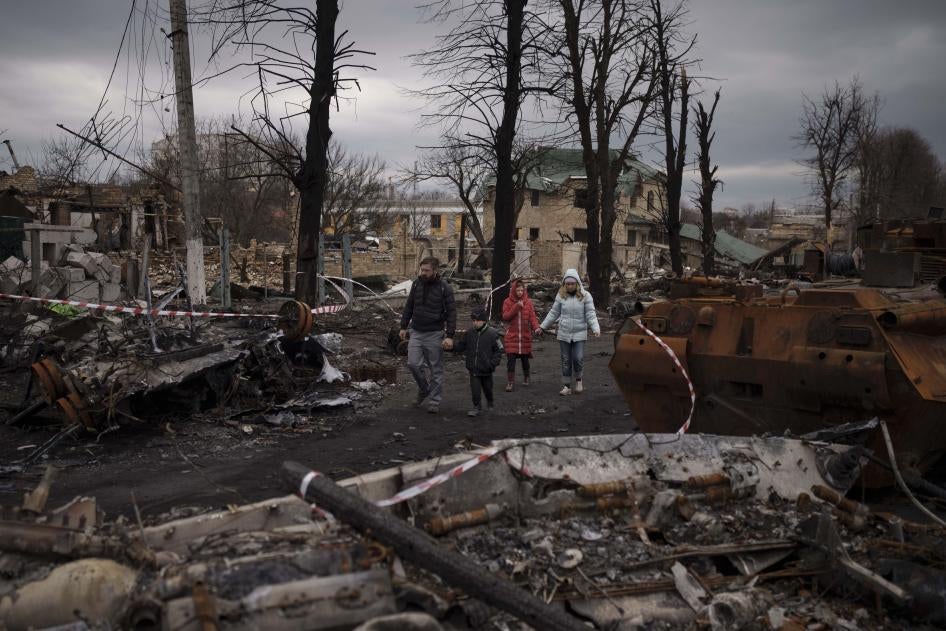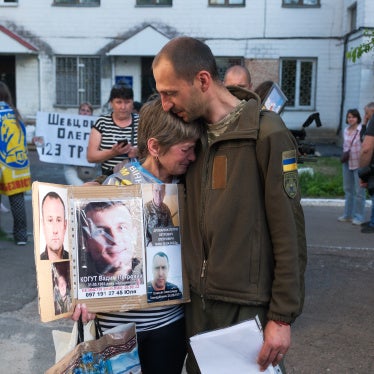(Kyiv, January 12, 2023) – Russia’s war in Ukraine has wrought a devastating toll on civilians and shattered civilian life in much of the country, Human Rights Watch said today in its World Report 2023.
Russian forces have committed apparent war crimes and crimes against humanity, including torture, summary executions, and enforced disappearances. They have carried out indiscriminate attacks on civilian areas and repeatedly targeted energy infrastructure, leaving millions of civilians periodically without electricity, water, and heat as winter temperatures plunged. More than 14 million Ukrainians have been forced to flee their homes. Information about Ukrainian forces violating the laws of war by mistreatment and apparent summary executions of prisoners of war, which would constitute a war crime, also emerged.
“Throughout the war, Russian forces have carried out horrific abuses in Ukraine with unconscionable disregard for civilian life,” said Yulia Gorbunova, senior Ukraine researcher at Human Rights Watch. “Accountability is crucial, both to bring justice to victims and survivors and to ensure that there is no impunity for these grave crimes.”
In the 712-page World Report 2023, its 33rd edition, Human Rights Watch reviews human rights practices in close to 100 countries. In her introductory essay, acting Executive Director Tirana Hassan says that in a world in which power has shifted, it is no longer possible to rely on a small group of mostly Global North governments to defend human rights. The world’s mobilization around Russia’s war in Ukraine reminds us of the extraordinary potential when governments realize their human rights obligations on a global scale. The responsibility is on individual countries, big and small, to apply a human rights framework to their policies, and then work together to protect and promote human rights.
Since Russia’s February invasion, the United Nations has reported at least 6,919 civilian deaths and more than 11,000 wounded as a result of the war in Ukraine and estimates the actual figures to be much higher. Approximately 6.5 million Ukrainians are internally displaced, and about 5 million have fled as refugees to European countries. About 2.8 million Ukrainians are in Russia and Belarus, in some cases against their will.
Russian forces have killed, arbitrarily detained, tortured, and forcibly disappeared civilians. Detainees reported beatings, electric shocks, mock executions, and water boarding, among other torture and mistreatment. Russian forces have also tortured Ukrainian prisoners of war. Russian soldiers held people in degrading conditions in basements, pits, boiler rooms, and factories.
In December 2022, the UN reported that between February 24 and October 21, it had documented 86 cases of sexual violence, most by Russian forces, including rape, gang rape, forced nudity, and forced public stripping in various regions of Ukraine and in one penitentiary facility in Russia. Women, including older women, and girls constituted the majority of reported victims and survivors. Hostilities, occupation, displacement, and destruction of medical services, as well as stigma and fear of retaliation, hindered survivors’ access to essential services and support.
Human Rights Watch and UN monitors have documented killings and torture of prisoners of war held by Russian forces, including torture leading to death. The UN also documented instances of ill-treatment of Russian prisoners of war held by Ukrainian forces.
Since February, Russian forces have repeatedly carried out disproportionate and indiscriminate bombing and shelling of civilian areas. These attacks destroyed and severely damaged homes, businesses, schools, health care institutions, and other facilities. Over 2,700 educational institutions have been damaged, more than 300 beyond repair.
These attacks have struck many hospitals, including at least one children’s hospital in Chernihiv, a maternity hospital in Kharkiv, and a maternity ward in Vilniansk. As of October, the World Health Organization had confirmed more than 700 attacks on healthcare facilities, personnel, and vehicles, which killed at least 200 people.
Many of these attacks on civilian areas have been with explosive weapons with wide area affects, including cluster munitions, unguided aerial bombs, and guided missiles.
At times, Russian and Ukrainian forces used schools for military purposes, leading to their coming under attack by the opposing force.
Ukrainian forces used cluster munitions in the Kharkiv region on a few occasions against areas under Russian control.
The use of antipersonnel landmines in Ukraine has been extensive.
Russian forces also carried out targeted attacks on civilians in vehicles trying to flee hostilities, without any apparent effort to verify whether the occupants were civilians.
Russian forces’ attacks on Ukraine’s energy infrastructure disrupted access to electricity, heat, and in some cases water services for millions of civilians throughout the country, ahead of and during the cold winter months. Russian military and other personnel restricted civilians fleeing hostilities in the Mariupol area in southern Ukraine from accessing Ukrainian-controlled territories, forcing some to stay in Russian-occupied areas or go to Russia. In some cases, Russian officials organized mass, forced transfers of Ukrainians, sometimes against their will or without providing any meaningful choice.
Russian officials also subjected thousands of civilians fleeing hostilities to compulsory, punitive, and abusive “filtration,” during which the officials collected extensive sensitive personal information including biometric data. An unknown number of people were detained during the filtration process and are presumed to be held in Russian-controlled regions.
The UN and human rights organizations have noted the disproportionate impact of the war on people with disabilities and older people. Some have been trapped in residential institutions facing enormous risks to their life and health. The UN and human rights and humanitarian aid groups have also highlighted the war’s disproportionate impact on women and girls, including female-headed households, and other marginalized groups.
As part of an unprecedented response to Russia’s full-scale invasion of Ukraine, multilateral organizations and foreign governments swiftly made use of a range of accountability mechanisms and tools, underscoring the importance of justice for serious crimes.









